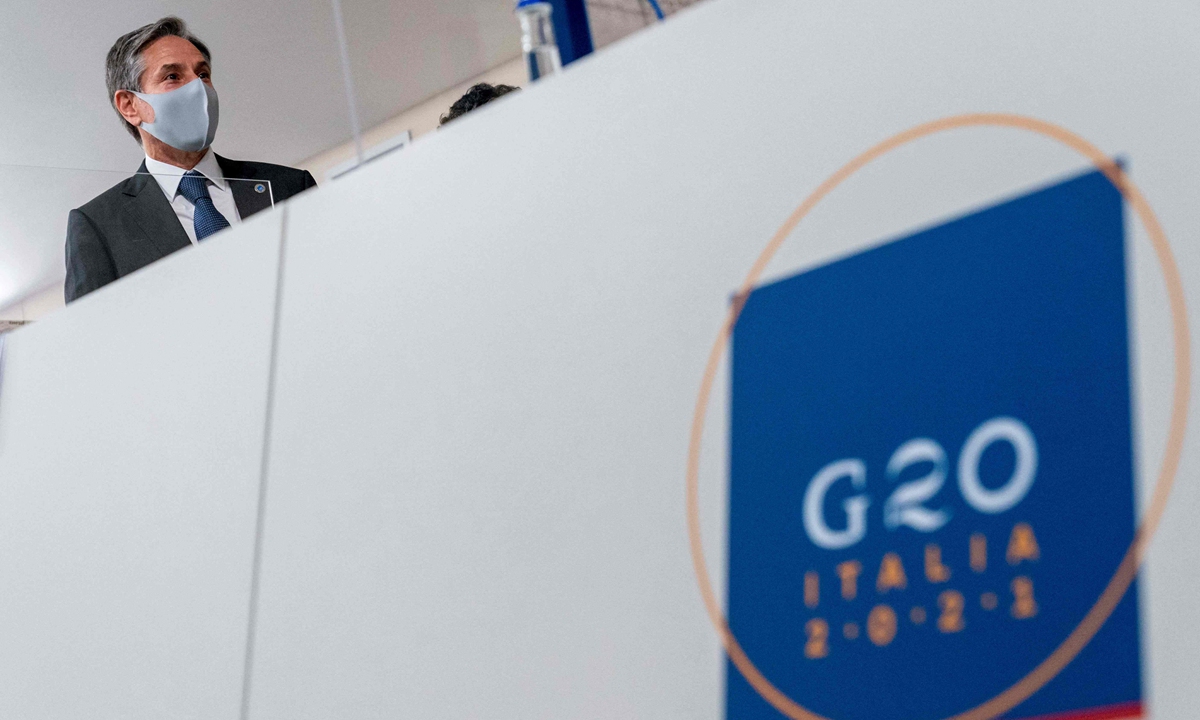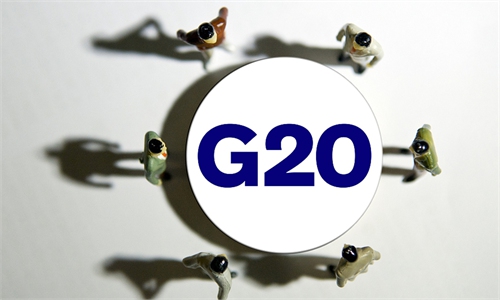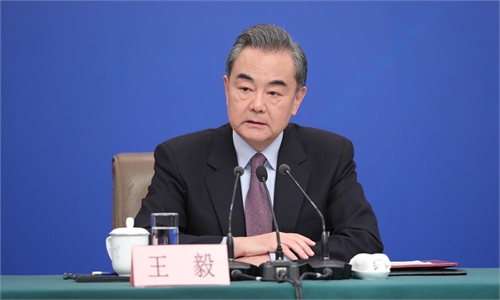China urges joint efforts in post-pandemic recovery at G20 despite US agenda
Nation provides 450m vaccine doses, urges sharing

US Secretary of State Antony Blinken arrives for a G20 foreign and development ministers meeting in Matera on Tuesday. Photo: VCG
Chinese State Councilor and Foreign Minister Wang Yi on Tuesday attended the G20 foreign ministers' summit via video link, which is expected to enhance key economies' communications and cooperation on economic recovery and jointly fighting the COVID-19 pandemic, despite the US not giving up on selling its anti-China agenda.At the invitation of Italian Foreign Minister Luigi Di Maio, Wang attended the meeting via video link in Beijing on Tuesday, where he stressed global anti-epidemic cooperation, multilateralism, openness, global governance and other issues.
Elaborating on China's efforts in helping countries fight the coronavirus, Wang noted that China has provided more than 450 million doses of COVID-19 vaccine to nearly 100 countries, while calling on countries with the ability to provide vaccines to others to avoid excessive hoarding and contribute to eliminating the global "immunization gap."
On practicing multilateralism among member states, Wang said countries should adhere to win-win cooperation rather than engaging in zero-sum games. "Multilateralism is not a slogan hanging in the air, nor is it a disguise for unilateralism," he said.
Cui Hongjian, director of the Department of European Studies at the China Institute of International Studies, told the Global Times on Tuesday that the G20 foreign ministers' summit would continue to focus on boosting global post-pandemic recovery in areas like vaccine cooperation and infrastructure investment.
Cui cited the possibility of vaccine cooperation and wider recognition to accelerate global-scale inoculation schemes.
Lü Xiang, a research fellow at the Chinese Academy of Social Sciences, noted many developing countries, including some G20 members, are deeply plagued by the virus and its mutated strains. The developed world, though quicker in vaccination, faces daunting threat of the Delta variant.
The Delta variant has become the most prevalent strain in the UK and accounted for 20 percent of new infections in the US, after spreading in South and Southeast Asian countries.
Cui said infrastructure investment deals are another highlight of the summit.
A global minimum corporate tax rate of 15 percent, which was agreed on by G7 members, is expected to be further discussed at the G20, Cui said, noting a bottom rate could secure fiscal income for developing countries that are in urgent need of reining in the COVID-19 to restart the economies, but could weaken their advantage in attracting foreign investment.
The G20 framework will continue its role as countries look for unified solutions to problems concerning global development. However, the framework faces the shadow of US political warfare against China.
Observers said that US Secretary of State Antony Blinken is likely to seek the opportunity to claim "US economic leadership is back," sell Biden's infrastructure blueprint, and call for reconstruction of the world economic order to counter China's influence.
Washington is now clamoring against Beijing on almost all occasions, lobbying other countries to keep a distance from China, said Li Haidong, a professor at the Institute of International Relations of the China Foreign Affairs University.
The Italian foreign minister was quoted by media as saying Italy's ties with the US are more important than those with China at a joint press conference with Blinken, who expressed concerns over Rome's ties with Beijing and its participation in the China-proposed Belt and Road Initiative.
But Chinese observers saw the remarks as a pacifier for the US.
Relations with China and the US have different grounds in Italy's policy design, as they are a close commerce partner and an ally in NATO, respectively. Forcing Rome to make such a comparison and take sides only exposed the US' lack of confidence, Cui said.
When Biden's G7 visit exposed the group's internal differences and prompted Blinken to schedule a tour to Europe to double-check on Germany, France and Italy's stances, Washington can do even less at G20, experts said.
G20 countries, unlike the G7 members that share a value system with the US, are more practical, Lü said.
At the summit, Blinken is likely to mention the Build Back Better World project, but instead of fine words, G20 would rather hear specific plans that the US cannot come up with, the expert said.
Blinken told media during his latest visit to Europe that the US aim was not to hold back China but to build back the free and open system based on standards set after World War II as Washington seeks stronger solidarity with transatlantic allies.
The US State Department had accused China of economic coercion and posing challenges to global order, but Chinese Foreign Ministry spokesperson Wang Wenbin pointed out the US is the biggest destroyer of the world order by "quitting groups" and wielding sanctions and military threats against others.
US "rules-based order" is a US-dominant hegemonic system, Wang said at Tuesday's routine press conference, noting the world system is UN-centered and the rules are UN charter-based. World order is not hegemonic or made by a US-led clique. All countries should practice real multilateralism.



